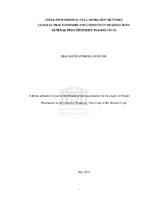| dc.description.abstract | The global movement towards enhancing inter-professional collaboration in patient
care is in light of the increasing potency of drugs and complexity of drug regimens,
particularly in the chronically ill where poly-pharmacy is rife, collaborative patient
management by general practitioners and community pharmacists, in particular, has
the potential to enhance patient therapeutic outcomes in primary healthcare.
Literature from other parts of the world has enumerated the advantages of
collaboration. South Africa with its unusual quadruple burden of disease and human
resource deficient public healthcare system would benefit from collaboration
between general practitioners and community pharmacists through expanded roles
for community pharmacists to enable them to make more meaningful contributions
to primary healthcare regimens. Particularly with the introduction of the National
Health Insurance (NHI) programme. This dissertation aims to assess from general practitioners‟ perspectives: the current level and stage of collaboration (using the collaborative working relationship (CWR) model proposed by McDonough and Doucette, 2001) between general practitioners and community pharmacists in patient care, if general practitioners‟ perceptions of the professional roles of community pharmacists in patients‟ care can influence desired collaboration (prospects of enhanced future collaboration) and how do general practitioners envision enhanced future collaboration between them and community pharmacists in patient care, possible barriers to the envisioned collaboration between the two practitioners, and how general practitioners‟ demographic characteristics influence inter-professional collaboration with
community pharmacists.
Sixty randomly selected consenting general practitioners in private practice
participated in a cross-sectional, face- to-face questionnaire study. The questionnaire
contained a range of statements with Likert scale response options. Data was
initially entered into Epi Info (version 3.5.1., 2008) and then exported to IBM SPSS
Statistical software for analysis (version19, 2010). Medians were used to summarize
descriptive data and Spearman‟s correlation coefficient, Mann-Whitney U Test and
Kruskal-Wallis Test was used for bivariate analysis. Ethical approval was granted by
the Senate Research and International Relations Committee, University of the
Western Cape (Ethical Clearance Number: 10/4/29).
The results indicated low-levels of current collaboration at stage 0 of the CWR
model between general practitioners and community pharmacists. A statistically
significant correlation was observed between general practitioners‟ perceptions of
the professional roles of community pharmacists and desired collaboration
(prospects of enhanced future collaboration), [p=0.0005]. Good prospects of
enhanced future collaboration between general practitioners and community
pharmacists were observed. General practitioners identified barriers to collaboration
to include: the lack of remuneration for collaboration, absence of a government
mandate or policy supporting collaboration, inability of general practitioners to
share patients‟ information with community pharmacists and questionable
professional ethics exhibited by community pharmacists particularly over financial
gains. Most general practitioners agreed that joint continuing professional education
organized by pharmaceutical companies or other groups will increase interaction and
enhance collaboration. Enhanced Inter-professional collaboration between general practitioners and community pharmacists‟ can be possible in the future but hindrances need to be eliminated for this to be achieved. Future research can be aimed at exploring the perspectives‟ of community pharmacists to inter-professional collaboration in South
Africa and interventions that will enhance collaboration. | en_US |

